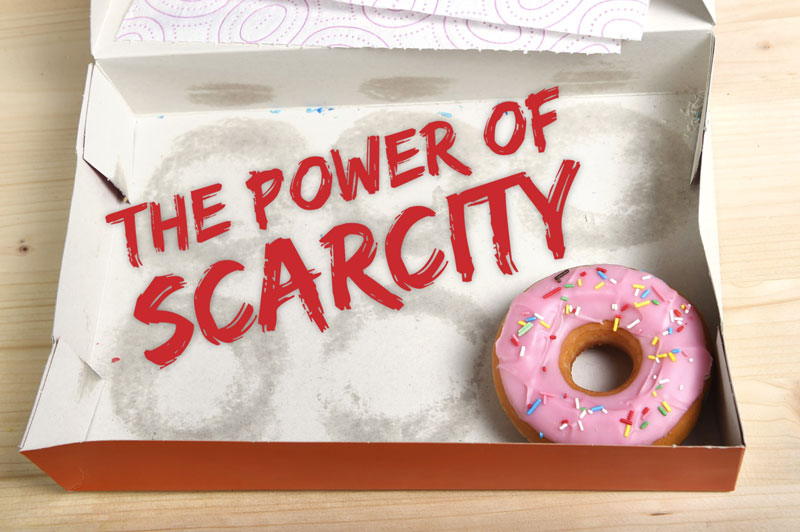Do you want to motivate your prospects or clients to take action? There are few things as effective as scarcity when it comes to marketing your product or service.
A few weeks back I found myself at one of those all-day seminars put on by a national company that offers workshops on everything from Project Management to Excel to Managing Difficult People.
I wasn't enjoying myself. Over the course of the morning I had learned little about Leadership, Team-Building, or Coaching Skills. What I had learned was available in countless blog posts, ebooks, and podcasts, all for free.
During the lunch break I took my car to Jiffy Lube and decided that afterward I'd either return to the office or find a coffee shop and catch up on some emails. However, Jiffy Lube turned my car around in record time and I saw that as some sort of sign that I should return…so back I went.
The afternoon was no better.
Here's Where Scarcity Kicks In
In fact, the afternoon was worse, because the presenter went into a long infomercial about becoming a member of this national seminar company. This membership, he told us, would let me attend every seminar they offered for a full year free of charge plus tons of free on-demand content from their member-only website. Normally, the membership was $499, but if we bought at the workshop it would only be $199.
Now, I got to thinking: $199 was a pretty good deal, because the workshop I attended was $249, if memory serves me. Not only that, I could go to countless seminars over the year on a wide variety of topics designed especially for business people just like me! If I went to just one seminar a month it would be like saving $2,789 over the course of the year! Plus, all that free content on their website? All the free worksheets, training videos, how-to's, and so on?!?
Of course, I wanted to sleep on it. And of course, I couldn't. The presenter was unapologetic: “Is it good tomorrow? No. It's an incentive.” I had to admire the brass ones on him for being so transparent.
I didn't want to miss out. I didn't want to pay an additional $300 for hesitating. I was sold.
And then….
I remembered that I didn't want to come back after lunch. I remembered that I had learned almost nothing during the day on a subject that I'm certainly no expert on. I realized that the documents and videos on their website were probably similar to ones I could watch for free on YouTube. I realized that if I attended a seminar each month I'd lose a day of productivity each month. Or almost 100 productive, billable hours over the course of the year.
Yes, I'm all for sharpening the ax, but my ax was as dull as when I walked in.
The spell was broken, but I couldn't help but notice how close it had come to working. I almost bought something I didn't want or need because of the fear it would be taken away, or at least the sweet deal would disappear.
Now I could just sit back and watch the master at work (because it was definitely working on the other people at the seminar.) I share it with you because you maybe can learn from it.
How He Sold Scarcity
Signing up for any membership can be tricky, and the least hiccup can cause “cart abandonment,” so he walked us through the process, having us take out the paperwork that had been included in our packet. He showed us exactly how to complete the paperwork and reinforced that he would stick around as long as necessary after the event to make sure that we could sign up today to get the discount.
There were some upgrades, so he talked us through our “preferred investment choice.” This wasn't an expense, it was an investment.
He had earlier determined that there were a few people who were already members in that day's class, and had already confirmed that they thought it was a great investment. So he asked those people, “is it worthwhile?” in this very public setting and of course they all gave it a big thumbs up. (Would any one of them have stated it wasn't a good deal and they had wasted their money…especially after being asked so publicly?)
I want to state for the record that I have no problem with how this company marketed their membership. Assuming they felt it was worthwhile (and I believe wholeheartedly that this facilitator did, compensation or not), then why wouldn't you try and make it easier to buy in?
Scarcity can be created out of any limit, self-imposed or otherwise.
- Scarcity can be based on time: “the last cruise of the day boards now!“
- Scarcity can be based on availability: “we only have six seats for the masterclass!“
- Scarcity can be based on money: “the early bird pricing goes up at midnight!“
The Downside of Scarcity
Unfortunately, scarcity can easily be abused. Some marketers create false scarcity, telling you there are limited seats for a webinar that can hold thousands of people, or a TV commercial that tells you you'll receive a free gift if you order in the next ten minutes, when actually everyone who calls gets the same free gift.
Even if the limits are real, scarcity can be manipulative if your product or service isn't valuable or worthwhile, but you prey on your audience's fear that they're missing out. (That's FOMO. Fear Of Missing Out.)
And if you pull the scarcity lever too often, it loses its power over your audience. Just ask the boy who cried wolf.
How to Use Scarcity Well
Assuming you believe in your product or service, there's nothing wrong in using scarcity as a marketing or sales technique. You may, in fact, have a limited number of Tom Brady bobbleheads for sale.
When it comes to events, people will wait until the last possible moment to buy tickets to keep their options open. To properly fund your event, you may need to incentivize early ticket purchases by offering discounts that are time sensitive. It's a great deal for people who know they want to attend the event.
Also, humans have a natural resistance to spending money, even when it's in their best interest. Sometimes, we have to incentivize them to overcome this resistance. Again, it's manipulative if your product offers no value. But, if you have a product that will improve their lives, or their jobs, or their relationships, it's imperative that you help them overcome their fear of loss and take a chance on what you have to offer.
Real World Examples of Scarcity in Marketing
We put on intimate “marketing masterclasses” here at flyte…small groups interested in hands-on learning on subjects like Facebook Ads, SEO, and Google Analytics. They are limited to six people at a time because we've found that this is a great number of people to work with. Also, with two instructors, that's the maximum number of people who comfortably fit in our conference room! That's real scarcity.
 We have our annual Agents of Change Digital Marketing Conference every September…a full day event with digital marketing experts from around the world that takes place in Portland, Maine, and online. Putting on an event like this takes a lot of time and money. We have bills to pay that come due long before the event happens. So, we need to get people to make a decision about an event in September starting in April. To incentivize them to give us money early we discount their tickets (early bird.) In fact, every month the prices go up, constantly incentivizing people to “act now.” If we didn't do that, people would wait until the last possible moment to buy tickets, and we'd have no idea if we would have 100 or 500 people trying to get in the door.
We have our annual Agents of Change Digital Marketing Conference every September…a full day event with digital marketing experts from around the world that takes place in Portland, Maine, and online. Putting on an event like this takes a lot of time and money. We have bills to pay that come due long before the event happens. So, we need to get people to make a decision about an event in September starting in April. To incentivize them to give us money early we discount their tickets (early bird.) In fact, every month the prices go up, constantly incentivizing people to “act now.” If we didn't do that, people would wait until the last possible moment to buy tickets, and we'd have no idea if we would have 100 or 500 people trying to get in the door.
Small classes, limited runs, online courses that only open registration for two-weeks…these are all examples of how you can use scarcity in your own marketing and advertising?
So, what do you think? Are you currently using scarcity? If not, would you consider adding scarcity as one of your marketing tactics? Let us know in the comments below…but act quickly! The comments section closes tomorrow!
(No, not really.)
Rich Brooks

